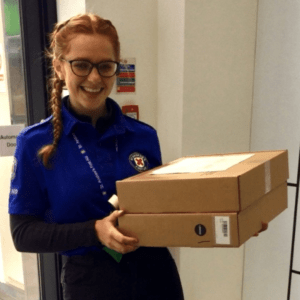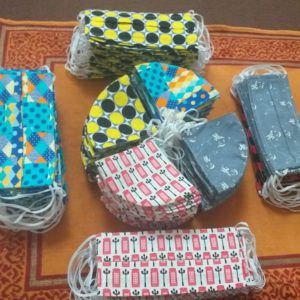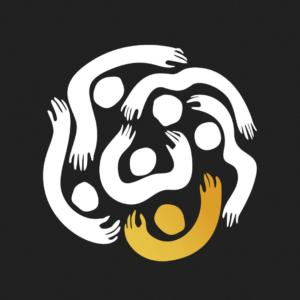When the pandemic hit in March 2020, everything changed overnight. Our office closed, but our work went on.
 People were unable to leave their homes and services usually delivered face to face, moved online or over the phone. Calls to our Helpline tripled. Staff and volunteers stepped up to help manage the extra demand by working from their bedrooms, kitchen tables and sofas.
People were unable to leave their homes and services usually delivered face to face, moved online or over the phone. Calls to our Helpline tripled. Staff and volunteers stepped up to help manage the extra demand by working from their bedrooms, kitchen tables and sofas.
In July 2020, we introduced Chatty, the digital assistant to help people visiting our website find answers to frequently asked questions. Within 10 weeks of launching, our digital chatbot had already handled over 500 queries and is still going strong!
Fadi’s story
Increased uncertainty caused by the pandemic is having a profound impact on the physical and mental health of people seeking safety. Fadi* is one of thousands of people who were moved into hotels by the Home Office at the start of the first lockdown.
He shared his story: “When I came to this country, I had so many plans. I thought, ‘you are so lucky to have a second chance’. Then for 11 months I was in a hotel. It was like I was in prison. I couldn’t meet anyone. I couldn’t do nothing. The food was not good and it gave me a bad stomach. I didn’t know what was happening. It felt like I was blind. I was so stressed and so alone. It felt like nobody cared.
“Scottish Refugee Council gave me a case worker, Tommy, and he helped me with everything – getting a flat, training, applying for college. Any time I needed to ask anything I could just call or text him. I’m happy where I live now. I can continue my life again. I can feel confidence in myself again.”
*Fadi’s name has been changed to protect his identity
Digital inclusion
Many of the people we work with don’t have smartphones, laptops or a reliable source of internet – tools which are now essential for connecting with the outside world.

We helped 217 households to get online by providing 167 laptops, 25 tablets, 24 smartphones and 160 wi-fi boxes. Some devices were donated. Others were purchased thanks to generous supporters and funding secured from the Scottish Government Wellbeing Fund.
Big thanks to the amazing volunteers from St Andrew’s First Aid, who stepped in to help with the distribution.
We also recruited and trained 56 volunteer Digital Champions who are helping people in refugee communities to access and use technology.
Africa Delice Community Group used the small grant we provided to run three online cookery classes for children and young people from refugee backgrounds.
Participants received digital devices, data and food parcels so that they could cook together. It was a fun way for young people to stay in touch and learn how to use technology while trying out new recipes and enjoying healthy meals.
They told us: “Our digital champion was very great at training the kids and helping all our sessions run smoothly. Food is an important part of our culture. Traditional cuisine is passed down from one generation to the next and is as an expression of cultural identity.”
Supporting communities
To help communities stay safe during the pandemic, we worked with Public Health Scotland to create accurate and accessible information about Covid-19 in multiple languages.
We also secured emergency funding to help grassroots community groups:
 provide food and other essentials
provide food and other essentials- overcome isolation and loneliness
- tackle digital poverty
- Improve mental and physical health
Our New Scots Connect digital forum helped 250 community groups, organisations and individuals across Scotland to stay in touch. They were able to share useful information online, including updates about lockdown rules and advice to help people access support.
After receiving a small grant from our Covid-19 Emergency Fund, volunteers from Re-ACT (Refugee Action Scotland) sewed more than 2,500 face masks for medics, social workers, young carers, local community centres and refugee communities across Edinburgh.
Fathi, a professional tailor who came to Scotland from Syria said: “I worked on this project to say thank you to the lovely people who welcomed me and my family.”
You can read more about this project and meet more of the New Scots involved here.
Celebrating arts and culture
 Sadly, Refugee Festival Scotland 2020 could not go ahead as planned. But people across Scotland joined us to mark World Refugee Day by sharing artwork designed by Syrian artist, Mousa Al Nana, on social media.
Sadly, Refugee Festival Scotland 2020 could not go ahead as planned. But people across Scotland joined us to mark World Refugee Day by sharing artwork designed by Syrian artist, Mousa Al Nana, on social media.
He explained: “As a refugee myself… it’s a great pleasure to be able to participate in this day and design these graphics. It’s a circle of people trying to uinite and make each other welcome and safe. This is exactly what a refugee would want to feel on this day.”
We also established a pilot mentoring programme to support artists and activists from refugee backgrounds. So far 10 artists have been paired with mentors and given small grants to help develop their work.
Mentor, Claire Robertson said: “Having been culturally displaced as a child, I never had a particularly easy path in life. As a young person, I struggled with issues of identity, isolation and community. But as an adult, I see how this has shaped and empowered me to help others. The time is ripe for me to share not only some of the success and failures of my creative and artistic practice, contacts and context but also some of the personal growth and development which helped me to better direct this journey.”
We’re delighted to have secured £300,000 from the Comic Relief Change Makers fund to launch Cross Borders, an exciting new programme which will expand and develop this work over the next three years.
